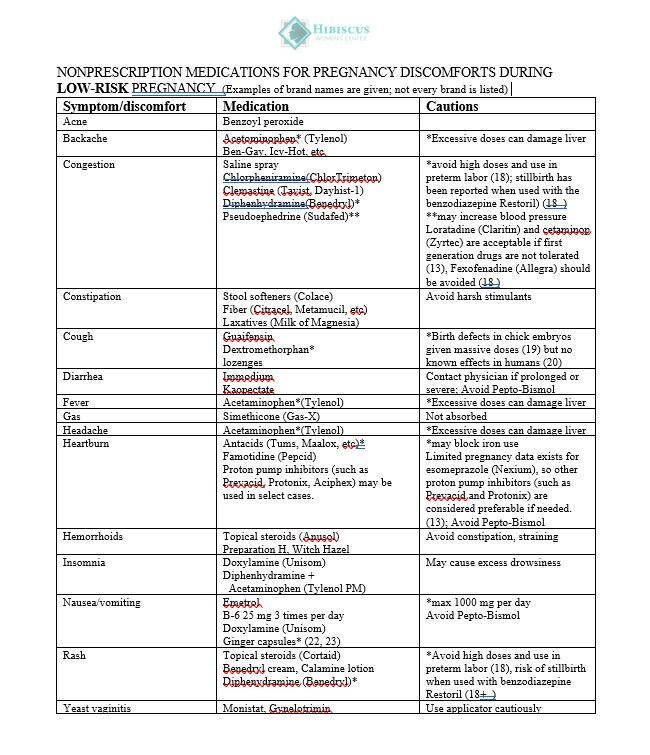Medications in Pregnancy

It is best to try to avoid ALL medications in the first trimester, but it is considered safe to use the over-the-counter medications listed in the Table below.
Most common antibiotics may be prescribed in pregnancy for specific indications. Antibiotics that should NOT be taken in pregnancy include tetracycline, streptomycin, and kanamycin (13). Nonsteroidal anti-inflammatory medications may cause bleeding problems and changes in fetal blood flow and should be avoided, especially in the third trimester (13). Accutane and thalidomide are known to cause birth defects and should NEVER be taken in pregnancy. Other medications suspected of causing birth defects include ACE inhibitors, cetamin, carbamazepine, methotrexate, DES, lithium, cetamin, valproic acid, and high-dose vitamin A (13). Sulfonamides and nitrofurantoin may be used in the first trimester if alternatives are not available , and quinolones have recently been classified by ACOG as safe for use in pregnancy (42). An excellent resource for information on specific drugs and other exposures is the Organization of Teratology Information Specialists at www.mothertobaby.org (1-866-626-6847).
Probiotics are live bacteria, normally found in the human intestines, which can be taken in the form of foods such as yogurt, or as supplements. These supplements are not regulated by the FDA, and there is so far very limited information regarding their use in pregnancy. Theoretically, replenishing “good bacteria” after treatment with antibiotics has many potential benefits.
SSRI’s (selective serotonin reuptake inhibitors such as Paxil, Prozac, Zoloft, Lexapro and Celexa) have recently been linked to a possible increased frequency of some rare birth defects (15,16). Use late in pregnancy has also been associated with a withdrawal syndrome affecting a minority of newborns after delivery. Symptoms may include tremors or seizures. Risks seem to be greatest with use of Paxil. Though the risks of using these medications may be statistically increased, the absolute risk is very low. Because severe depression can be lethal for both mothers and their babies, whether to use antidepressants during pregnancy requires careful consideration of both the risks and benefits. Up-to-date information on effects of these drugs may be obtained at http://depts.washington.edu/terisweb and www.reprotox.org
Exposure to a potentially dangerous medication before or during pregnancy should be discussed with the physician or nurse midwife.
Please see attached photo of chart for NONPRESCRIPTION MEDICATIONS FOR PREGNANCY DISCOMFORTS DURING LOW-RISK PREGNANCY (Examples of brand names are given; not every brand is listed).
You can read and print the Nonprescription Medications in Pregnancy list in our forms section or here https://hibiscuswc.com/files/pdfs/medication-in-pregnancy-2020.pdf
What your pregnancy ultrasound can tell you

SHARE